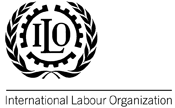MORE:
> 2011 press releases
“Making Globalization Socially Sustainable” underlines globalization’s potential to stimulate productivity and growth but highlights the importance of pursuing trade, employment and social policies together in order to harness this potential. The book contains contributions from leading academic experts who analyse the various channels through which globalization affects jobs and wages.
At the launch of the publication, WTO Director-General Pascal Lamy and ILO Director-General Juan Somavia said that this book will help to improve the understanding of how governments can give globalization a strong social dimension.
The publication reasserts the positive role that trade liberalization can play in improving efficiency and thus growth. It emphasizes the important role for governments in investing in public goods and in strengthening the functioning of markets that are crucial for globalization to be growth-enhancing. The key role of social protection is highlighted, as is the need to adjust social protection systems to local conditions.
The volume is organized around three main themes that have received significant attention recently: employment, uncertainty in the job market and inequality. The book deals with questions such as the short-term effects of globalization on unemployment rates (Holger Görg) and the long-term effects of globalization on the structure of employment in developing economies (Margaret McMillan and Dani Rodrik). Employment effects during the Great Recession of the late 2000s are addressed in a chapter by David N.F. Bell and David G. Blanchflower. John Haltiwanger explores the uncertainty in labour markets while William Milberg and Deborah Winkler examine the uncertainty perceived by workers who are affected by import competition. Policies to address how external factors affect labour markets are discussed, with particular attention on the viability of policies in developing countries (Devashish Mitra and Priya Ranjan). One chapter is dedicated to the latest evidence on the distributional effects of globalization (Nina Pavcnik) and this is followed by an analysis of the capacity of national governments to address distributional concerns in a globalized world (Carles Boix). The book ends with a chapter on the role of education and skills policies in spreading the benefits of globalization (Ludger Woessmann).
The publication highlights three challenges faced by policy-makers as they seek to ensure the social sustainability of globalization. First, the structure and levels of employment resulting from increased openness can be more or less favourable to the labour force and to economic growth. Second, openness — while helping to offset domestic difficulties — can increase the vulnerability of domestic labour markets to external factors, as witnessed during the Great Recession. Third, the gains from globalization are not distributed equally and some workers and firms may lose in the short and even medium term. The authors of this book discuss policy responses to these three challenges.
The publication is a product of the collaborative research programme of the International Labour Office and the WTO Secretariat and has benefited from funding by the International Chamber of Commerce (ICC) Research Foundation. “The International Chamber of Commerce will draw from the findings of this research project to make concrete policy recommendations to global decision makers,” said ICC Chairman Gérard Worms. “The ICC Research Foundation is very pleased to have supported this project, which will contribute to a better understanding of making globalization sustainable.”
> Problems viewing this page?
Please contact [email protected] giving details of the operating system and web browser you are using.


